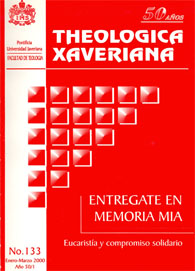Abstract
En la época del posexilio, cuando aún no se había reconstruido el templo, el ayuno era una de las prácticas rituales a la cual acudía Israel para hacer oir su voz ante Yahvé. Pero la situación del pueblo en esos años era aún lamentable debido a que la restauración de Jerusalén seguía aplazada y los pobres y afligidos abundaban. El texto que aquí estudiamos, datado precisamente en esos años, amonesta al pueblo porque al mismo tiempo que insiste en esas prácticas rituales, descuida la práctica de la justicia y el derecho.
Estos versículos también exhortan a trasformar su relación con Dios cambiando el ayuno ritual por un ayuno existencial: entregarse al necesitado, tomar en cuenta a los miembros afligidos del pueblo; en otras palabras, a practicar la misericordia con el prójimo más débil. Esta trasformación garantizará una adecuada relación con Yahvé, una gozosa unión con Dios. De esta forma la situación nueva se vivirá como un auténtico estado de salvación, en la línea en que insistieron los profetas clásicos.
This journal is registered under a Creative Commons Attribution 4.0 International Public License. Thus, this work may be reproduced, distributed, and publicly shared in digital format, as long as the names of the authors and Pontificia Universidad Javeriana are acknowledged. Others are allowed to quote, adapt, transform, auto-archive, republish, and create based on this material, for any purpose (even commercial ones), provided the authorship is duly acknowledged, a link to the original work is provided, and it is specified if changes have been made. Pontificia Universidad Javeriana does not hold the rights of published works and the authors are solely responsible for the contents of their works; they keep the moral, intellectual, privacy, and publicity rights.
Approving the intervention of the work (review, copy-editing, translation, layout) and the following outreach, are granted through an use license and not through an assignment of rights. This means the journal and Pontificia Universidad Javeriana cannot be held responsible for any ethical malpractice by the authors. As a consequence of the protection granted by the use license, the journal is not required to publish recantations or modify information already published, unless the errata stems from the editorial management process. Publishing contents in this journal does not generate royalties for contributors.


